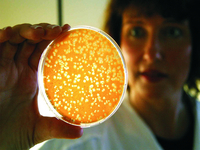How the DSMZ contributes

Within the DSMZ department of microorganisms, a bacteriophage (short: phage) collection and phage methodology were established more than 30 years ago. Because of the therapeutical use and the undoubted applicative future potential of phages the DSMZ substantially expands the phage collection, particularly for different bacteria that are pathogenic for humans, animals or plants, apart from a general DSMZ interest in collecting the global broad phage biodiversity which includes also fastidious bacteria and bacteria for which phages are so far rarely described. The DSMZ is one of the very few culture collections worldwide with growing phage holdings that are furthermore used for own research projects. Several phage research projects are feeding substantial numbers of new phages into the open collection and on the other hand, research benefits from the open DSMZ collection. The bacterial DSMZ collection straightforwardly supports the isolation of many new phages and provides an insight into host spectra of the phages which is a central issue for all applicative phage research.
One main goal is the considerable growth of the collection of therapeutically interesting phages for human medicine, to characterize them in the own DSMZ laboratories according to state-of-the-art methodology and to provide the phages according to DSMZ quality standard procedures as laid down by the OECD Best Practice Guidelines for Biological Resource Centres (including quality management, biosafety and biosecurity, building capacity, preservation of biological resources and data management; OECD, 2007, Paris, France). The phage collection meets the main DSMZ mission to function as an open service supply collection for the international scientific community, as a pool for basic and applicative phage research, for industry, testing and teaching. Two curatorships with different focus belong to the phage working group, the Clinical Phages and Regulations and the Phage Genomics and Application. Along with the physically growing phage collection, also the establishment of phage data collections will be intensified.
The DSMZ as a member of the Leibniz Association and as an important partner within the German scientific research infrastructure has a high number of dedicated research projects with a societal significance. Since a decade, the DSMZ has numerous externally funded research projects that play emphasis on phage application, most of them in the context of human use: fundamental phage microbiology and phage characterization are performed in research & development approaches in several running or finished projects. The phage working group cooperates with internationally renowned phage experts in biology and medicine and is engaged in national and international initiatives to endeavour recognition of phage therapy in Europe and to support realization as an additional therapeutic avenue.
Important:
Like all other DSMZ bioresources, also phages are for laboratory use only, not for direct application in humans or animals. For direct application, phages must be further propagated and a new stock under appropriately controlled conditions must be prepared. DSMZ phages are available for authorized recipients who must have a laboratory with the biosafety level that corresponds to the phage host bacterium. The DSMZ assumes that recipients / customers of phages are sufficiently experienced in working with phages.

